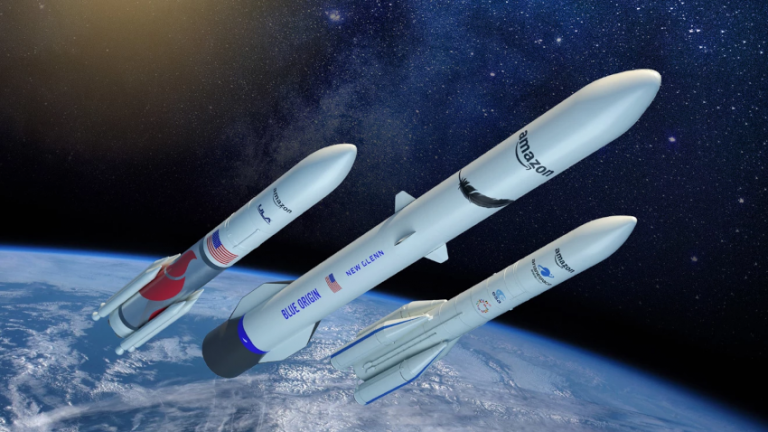

Amazon's Project Kuiper satellites get launch approval from the FCC
source link: https://siliconangle.com/2023/02/09/amazons-project-kuiper-satellites-get-launch-approval-fcc/
Go to the source link to view the article. You can view the picture content, updated content and better typesetting reading experience. If the link is broken, please click the button below to view the snapshot at that time.

Amazon's Project Kuiper satellites get launch approval from the FCC

Amazon.com Inc.’s Kuiper Systems LLC satellite division was granted permission to go ahead with its first launches, according to a ruling by the Federal Communications Commission today.
The FCC’s International Bureau provided its stamp of approval on an orbital debris mitigation plan submitted by Kuiper, removing one of the last hurdles in the way of its launch plans. The approval was required to satisfy conditions first imposed on the Amazon subsidiary in 2020, when it received a tentative go-ahead to launch a network of 3,236 satellites into low Earth orbit.
“Our action will allow Kuiper to begin deployment of its constellation in order to bring high-speed broadband connectivity to customers around the world,” the FCC’s order stated.
Project Kuiper is a rival to SpaceX Corp.’s Starlink network, designed to provide broadband internet access from satellites to millions of people across the world who lack reliable connectivity to the web. It’s said that Kuiper will also help to boost the reach of Amazon Web Services Inc.’s cloud computing platform. In November, AWS said it would partner with Kuiper on an initiative that aims to upgrade the U.S. military’s communications systems.
In April 2022, Kuiper announced it had struck a series of deals with rocket makers, including United Launch Alliance LLC, Arianespace SA and Blue Origin LLC, the aerospace company of Amazon founder Jeff Bezos. Those deals cover 83 separate launches over five years and would allow Kuiper to get the majority of its 3,236-strong satellite constellation up into orbit.
Kuiper will kick off with the launch of two prototype satellites later this year on ULA’s new Vulcan Centaur rocket. It’s not yet clear when Kuiper will start launching its first production satellites.
“Our orbital debris mitigation plans demonstrate the Kuiper System is designed to meet or exceed all requirements set forth by the FCC,” a spokesperson for Amazon said. “We are pleased that the Commission has granted our application and we appreciate the coordination to ensure the industry is prioritizing safety.”
According to the FCC, the orbital debris mitigation plan submitted by Kuiper is “sufficiently developed to support deployment of its NGSO [non-geostationary orbit] satellite system.”
Amazon’s main rival SpaceX vehemently opposed the plan, filing a number of objections with the FCC in a bid to derail Kuiper’s launch ambitions. However, the FCC dismissed SpaceX’s objections, as well as those from another satellite firm, Viasat Inc. SpaceX reportedly argued that the FCC should restrict Kuiper “to launching only 578 satellites within its 630-kilometer orbital shell and defer action regarding the remainder.” It said this is necessary to “address Kuiper’s ability to coexist with other systems in and around its 590km and 610km shells, and allow for continued monitoring of deployment.”
However, the FCC ruled that it isn’t necessary to impose such a limit on Kuiper, saying the mitigation plan proposed by Kuiper was already designed to address SpaceX’s concerns. “We do not see a specific need to further limit Kuiper’s authorization,” the Commission stated in its ruling. “While SpaceX expresses concern over Kuiper’s ability to co-exist with other systems at certain altitudes, similar to Viasat, it does not specify a particular risk presented by the deployment of an identified planned system.”
SpaceX further argued that Kuiper’s satellite disposal strategy would place its satellites on an elliptical orbit, and that the “variable effects of atmospheric drag on orbit evolution will result in large uncertainties in the predicted trajectories of the Kuiper satellites.” As such, that would make it too difficult for other satellite operators to assess and mitigate risk, SpaceX declared.
Kuiper responded to this criticism by saying it will use Global Positioning System measurements to perform orbit determination on all of its satellites during the deorbiting process, enabling it to “share high-accuracy location information with operators on a real-time basis.” That was enough for the FCC, which added that plan as a condition to the license granted to Kuiper.
SpaceX’s determination to delay Kuiper’s plans suggests it could be wary of the competition it will provide. Starlink’s broadband speeds have reportedly been dropping as more users sign up to the service, though it has plans to expand its own constellation by getting yet more satellites into space.
Image: Amazon
A message from John Furrier, co-founder of SiliconANGLE:
Show your support for our mission by joining our Cube Club and Cube Event Community of experts. Join the community that includes Amazon Web Services and Amazon.com CEO Andy Jassy, Dell Technologies founder and CEO Michael Dell, Intel CEO Pat Gelsinger and many more luminaries and experts.
Join Our Community
Click here to join the free and open Startup Showcase event.
We really want to hear from you, and we’re looking forward to seeing you at the event and in theCUBE Club.
Click here to join the free and open Startup Showcase event.
Recommend
About Joyk
Aggregate valuable and interesting links.
Joyk means Joy of geeK